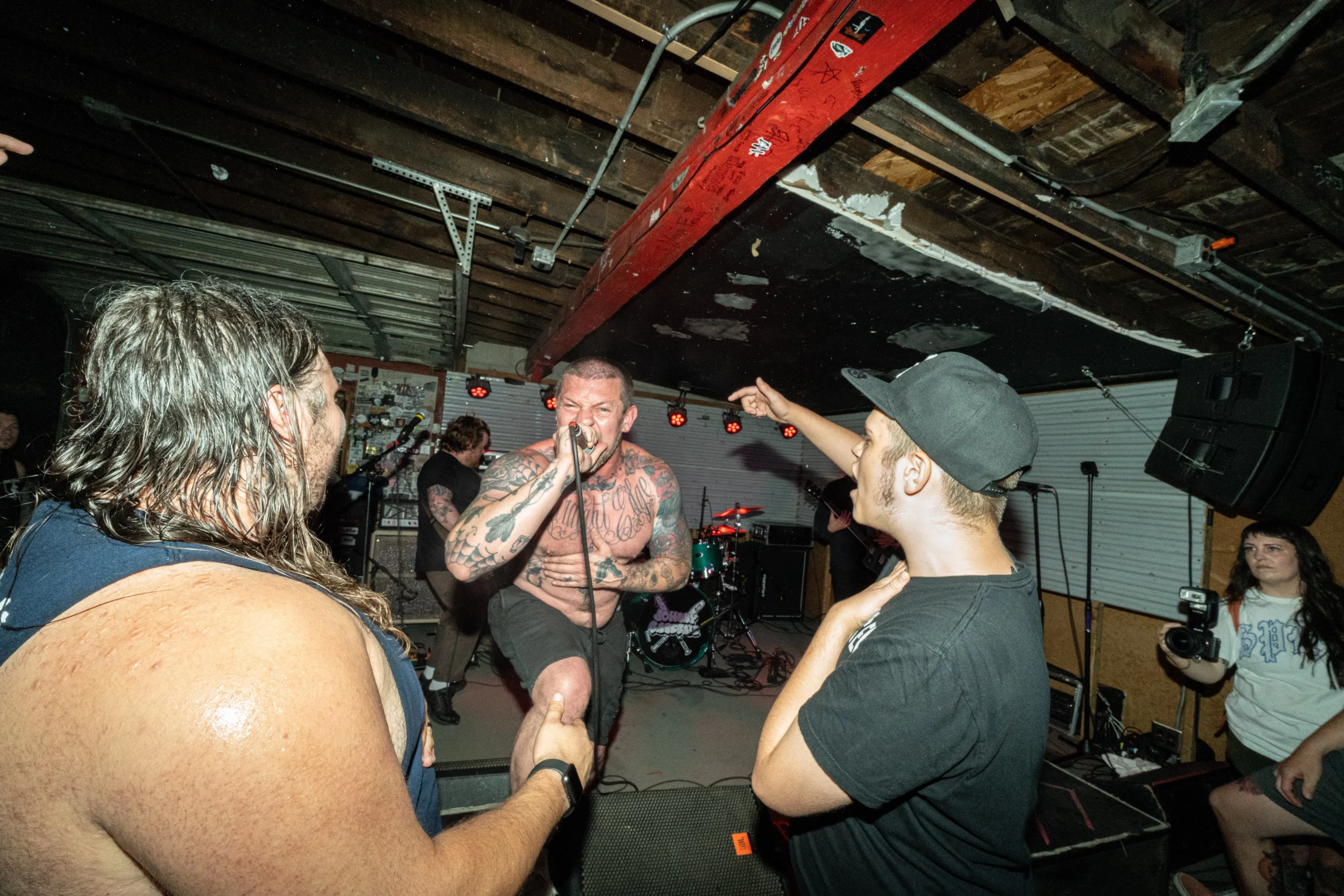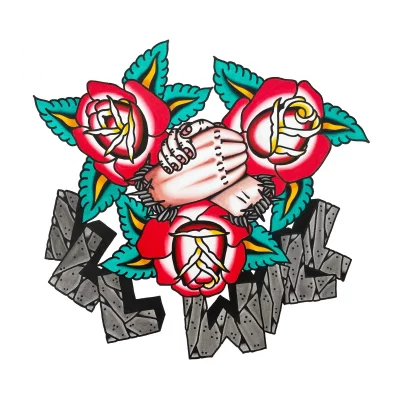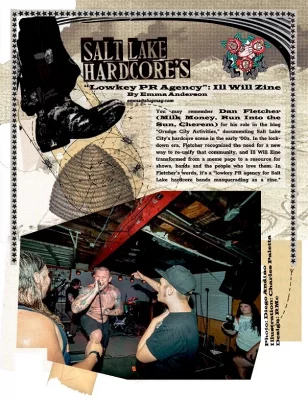
Salt Lake Hardcore’s “Lowkey PR Agency”: Ill Will Zine
Music Interviews
Circa 2007, when Salt Lake City’s hardcore scene was in a slump following its heyday in the ‘90s, longtime friends Trevor Hale and Dan Fletcher asked themselves, “How do we get people to come to shows?” The answer was found in the creation of Grudge City Activities (GCA), a Blogger site that garnered as many as 10,000 monthly visitors through posting about local hardcore news during a time where media targeting that community was hard to come by.
Though GCA’s most active days came to an end in the early 2010s, inspiration struck when Fletcher logged back into GCA’s social media in 2020 to post “dumb hardcore memes” that had been passed back and forth in his band Milk Money’s group chat. With GCA’s first Instagram post in years, it occurred to Fletcher that it was a fun, accessible way to reconnect the hardcore community digitally during the lockdown. This scene-specific shitposting reached a demographic of “younger kids in bands,” tuning Fletcher in to more and more local hardcore shows that were happening. He began sharing flyers for upcoming shows as they made their return, excited by the surge of new bands popping up. Hale and Fletcher realized that they were cultivating something much bigger than a meme page with the same spirit of GCA, but figured it was time to call it something different. Fletcher says he “loved the idea of doing a zine again, but it shouldn’t be tied to some dated insider reference.” He explains that he conjured up the name “Ill Will” randomly, simply because it sounded cool, but ran with it as it has “kind of a cliche hardcore meaning” while also meaning “being driven and motivated.” Fletcher describes the @illwillzine account succinctly as something that “started out as a dumb hardcore meme account during COVID-19 and then blossomed with the Salt Lake hardcore scene reviving into something bigger.” Ill Will has since become a go-to resource to learn about upcoming shows and hardcore going on.

Unity and connection are virtues for Fletcher, who found a sense of belonging in “growing up playing in bands and touring, being able to see the world just playing in shitty hardcore bands.” For him, punk and hardcore cultivate connections all over the world. He speaks to the strength in the unity of Salt Lake City’s music scenes that seem to connect as they fall under the broader umbrella of hardcore. “When I started going to shows in Salt Lake, scenes didn’t cross over. And there was no such thing as a mixed bill,” Fletcher says of his experiences in the early ‘00s. He also notes that the local hardcore scene was much more “insular and clique-y” back then. Fletcher appreciates the Salt Lake City music scene’s move away from divisions based on genre or social circle, in which Ill Will plays a role. “I had people who were into every different niche subgenre of heavy music, getting stoked about this one thing,” Fletcher explains.
“At a certain point you realize it’s not the tuning of the guitar or the specific tempo … there’s something deeper in all this music that falls under punk.”
While the term “hardcore” brings to mind a specific type of heavy music, for Fletcher, it’s much broader and more meaningful than that. “[Hardcore was] always this culture that was willing to find different ways of living outside of mainstream society and different ways of building community outside of mainstream society,” he says. In a culture of conservative “values,” bigotry and hyper-individualism, hardcore offers “a culture that is willing to function in a communal way, outside of the norms, outside of all the stuff that we, regardless of genre, see as bullshit, whether that’s a political system or religious system or societal norms,” says Fletcher. When it comes to hardcore as a genre, Fletcher explains that “at a certain point, you realize it’s not the tuning of the guitar or the specific tempo … there’s something deeper in all this music that falls under punk.” One of the goals of GCA back in its heyday, and of Ill Will today, is to “cover everything that falls under that umbrella. To us, it’s whether it’s a beatdown deathcore band or just a purist, classic punk band … that’s all gonna go on there, and it’s all gonna get supported and promoted,” Fletcher says.
That’s, at least in part, is why Salt Lake City’s hardcore scene has the impact, reputation and power that it does. A relatively isolated state with a particularly religious, conservative dominant culture creates a rebellious counterculture to match. Fletcher draws upon his experience across generations of Salt Lake City’s scene to explain what the punk and hardcore acts of years past have in common with up-and-coming bands of high schoolers: “Being in this remote, fucked up culture where you have to express yourself if you’re going to stay sane.” He also asserts that the heavy music that comes out of Salt Lake City is unique, and even as more bands are influenced by artists all over the world through the internet, the “spirit that runs through Utah” remains intact.
While many an old head has asserted that kids these days need to “know their roots,” Fletcher’s priority with Ill Will is to share and uplift newer, younger bands. While he agrees that “when you know the history and the roots, whether it’s local or just of the genres, it gives your passion that substance, that it isn’t just like some trend … there’s deeper roots to this alternative culture,” he has no intention of Ill Will being an archival project, preferring to keep the focus on what’s up-and-coming with the youth.
“[I had] no sense of how to function … then, I found hardcore and I found principles about how I could do something myself—that DIY ethic. It also gave me something that was therapy, like 20 years before I knew I needed therapy [and] actually got it.”
When it comes to the discourse, drama and divisions that permeate music scenes, Fletcher is wise enough to shove that all to the side to focus on his goal of promoting and connecting the community that means so much to him. “I care about the community and the music and you can miss me with all that other stuff for sure. I’ll just be the out of touch older dude who’s just putting on for people,” he says. In many ways, this attitude is preserving what drew Fletcher to hardcore in the first place. He credits that community with not only changing, but saving, his life. “Growing up with ADHD, depression, anxiety, [all] undiagnosed,
[I had] no sense of how to function … then, I found hardcore and I found principles about how I could do something myself—that DIY ethic,” he explains. “It also gave me something that was therapy, like 20 years before I knew I needed therapy [and] actually got it,” he says.
As an SLC hardcore veteran, Fletcher is often asked how one gets more involved in “the scene.” His answer? “Just fucking do it.” The “it” in question could be anything: “a band, take photos, shoot videos on your phone and put them up, make art, do graffiti, pass out flyers…” Take this as your cue to let go of the excuses as to why you can’t get involved. Follow Ill Will on Instagram @illwillzine and keep an ear to the ground for their upcoming projects.
 Graphic Designer: Rob McOmber | behance.com/rmc | dribbble.com/rmc
Graphic Designer: Rob McOmber | behance.com/rmc | dribbble.com/rmc
Walk us through how you created this layout. What inspired you when designing it?
I read about Ill Will Zine and the culture of the hardcore music scene in Utah [and] came up with some imagery that has a underground/zine/counterculture/punk/raw style which would appeal to hardcore music fans. I came up with imagery symbolizing a rejection of authority and conformism by showing a big boot stomping on the symbolic state of Utah’s beehive, with its obedient bees and conservative society. The destruction of that beehive society could result in personal injury from the bees, however, which can be the risk taken of destruction of that authority.
Tell us about your design background. How has your style evolved over time?
I have a long history in art since [I was] a child, working in my childhood home’s laundry room. After a degree in Visual Communications and the birth of the modern internet in 2003, I began my career in web design and development. I have continued my career to this day for the last 15 years with MobileRider, a SaaS company specializing in video streaming. My career has allowed me to work with big-name clients such as Arm & Hammer, NASA, U2, Maroon 5, Mariah Carey, Madonna, Nike, Adobe, Monster and numerous local Utah businesses. My style has always been about finding originality and authenticity through strong visual communication.
What are some of your design inspirations or influences?
My inspirations and influences have included skateboard graphics, graffiti and street art, zines, typography, design blogs, album art, stickers and fine art. But graphic design is everywhere and I’m always on the look out for any design that interests me.
What does your graphic design process usually look like?
I start by thinking of all kinds of ideas in my head for days before I touch the computer, consult my computer’s giant image library and images online for ideas and then play with it on the computer until it’s right.
What is your favorite aspect of graphic design?
Creating a visual representation of my ideas on the computer which can live on the screen and/or through printed matter that communicates to others.
Read more music interviews here:
Talking About Burlington, VT With Brunch
Picking Flowers: Alvvay’s Mindful Approach to Music